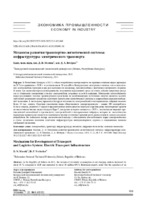| dc.contributor.author | Месник, Д. Н. | |
| dc.contributor.author | Вечёрко, Д. А. | |
| dc.coverage.spatial | Минск | ru |
| dc.date.accessioned | 2023-10-20T11:06:19Z | |
| dc.date.available | 2023-10-20T11:06:19Z | |
| dc.date.issued | 2023 | |
| dc.identifier.citation | Месник, Д. Н. Механизм развития транспортно-логистической системы: инфраструктуры электрического транспорта = Mechanism for Development of Transport and Logistics System: Electric Transport Infrastructure / Д. Н. Месник, Д. А. Вечёрко // Наука и техника. – 2023. – № 5. – С. 433-440. | ru |
| dc.identifier.uri | https://rep.bntu.by/handle/data/136421 | |
| dc.description.abstract | В Республике Беларусь в 2021 г. объем потребления электроэнергии на зарядных станциях вырос примерно на 38 % по сравнению с 2020 г. и составил около 10 млн кВтч. Белорусскими экспертами отмечено, что в эксплуатации электромобиль примерно в два раза выгоднее его владельцу, чем автомобиль с двигателем внутреннего сгорания. В целом для экономики при условии равенства загрязнения окружающей среды на этапах добычи природных ресурсов и утилизации электронных отходов электромобиль сохраняет за собой выигрыш. Обновление автомобильного парка фоссильного топлива транспортными средствами на возобновляемых источниках энергии является задачей, требующей реализации механизма адаптации транспортно-логистической системы к современным вызовам глобальной экономики. К настоящему времени в Беларуси численность электромобилей и подзаряжаемых гибридов немного более 10 тыс. единиц. Отмечено увеличение парка общественного электротранспорта – свыше 100 электробусов. В свою очередь, развитие IT-сферы и продиктованная необходимость перехода к производству транспортных средств на экологически чистые виды стандарта Евро-7, внедрение которого ожидается с 2025 г., подтолкнули мировых производителей автомобилей к производству электромобилей и подзаряжаемых гибридов, которые по экологическим параметрам превосходят аналоги на ископаемом топливе и отвечают времени роста располагаемого дохода массового потребителя. Во избежание потерь экономической выгоды с обновлением автомобильного парка электромобилями в статье исследован механизм адаптации инфраструктуры автотранспортного сервиса к современным вызовам глобальной экономики. | ru |
| dc.language.iso | ru | ru |
| dc.publisher | БНТУ | ru |
| dc.title | Механизм развития транспортно-логистической системы: инфраструктуры электрического транспорта | ru |
| dc.title.alternative | Mechanism for Development of Transport and Logistics System: Electric Transport Infrastructure | ru |
| dc.type | Article | ru |
| dc.identifier.doi | 10.21122/2227-1031-2023-22-5-433-440 | |
| local.description.annotation | In the Republic of Belarus in 2021, the volume of electricity consumption at car charging stations increased by about 38 % compared to 2020 and amounted to about 10 million kWh. Belarusian experts noted that the operation of an electric car is about 2 times more profitable for its owner than a car with an internal combustion engine. In general, for the economy, under the condition of equality of environmental pollution at the stages of extraction of natural resources and the disposal of electronic waste, the electric car retains a win. Renewal of the fossil fuel vehicle fleet with vehicles powered by renewable energy sources is a task that requires the implementation of a mechanism for adapting the transport and logistics system to modern challenges of the global economy. To date, the number of electric vehicles and rechargeable hybrids in Belarus is slightly more than 10 thousand units. An increase in the public electric transport fleet was noted – over 100 electric buses. In turn, the development of the IT sector and the need to switch to the production of vehicles for environmentally friendly types of the Euro-7 standard, the introduction of which is expected from 2025, prompted global car manufacturers to produce electric vehicles and rechargeable hybrids, which are superior in environmental parameters to fossil-based counterparts fuel and correspond to the time of growth of the disposable income of the mass consumer. In order to avoid the loss of economic benefits with the renewal of the car fleet with electric vehicles, the paper examines the mechanism for adapting the infrastructure of the motor transport service to the modern challenges of the global economy. | ru |

